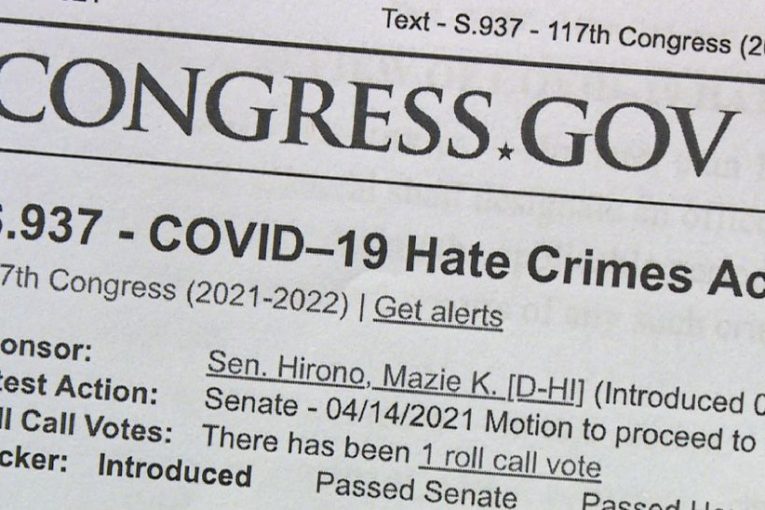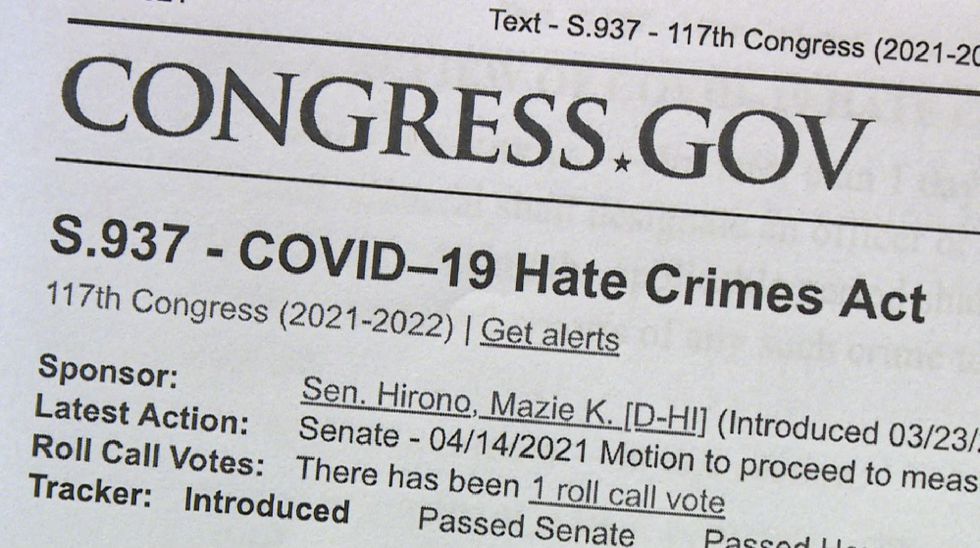
 By Meenu Pamula
By Meenu Pamula
ATLANTA– On March 16, 2021, in Atlanta, Georgia, a 21-year-old white man committed a mass shooting, killing eight people, six of whom were women of Asian-American descent. Because of the location and the targeted nature of the victims, officials believe the shooting was racially motivated. This shooting was one of many crimes seen as an uptick in violence against Asian-Americans.
This shooting and many other crimes led the U.S. Senate to pass the COVID-19 Hate Crimes Act in an effort to address the rise in racially motivated violence against Asian-Americans. The bill cleared the Senate this month on April 22 with near-unanimous approval.
With this in mind, we look back on the tragic Atlanta shooting and the discrimination seen through recent months. The Atlanta shooting took the lives of eight individuals: Soon Chung Park, 74; Hyun Jung Grant, 51; Suncha Kim, 69; Yong Ae Yue, 63; Delaina Ashley Yaun, 33; Xiaojie Tan, 49; Daoyou Feng, 44; and Paul Andre Michels, 54.
In his statement, the county sheriff’s spokesman stated that the shooter was having a “bad day,” to which the obvious moral response: “We all have bad days. That’s not an excuse or an explanation for murder.” In referring to a mass shooting that cost eight people their lives as the byproduct of a “bad day,” the spokesman undermined the gravity of this crime, thus causing increased fear and distress for Asian-Americans who have been brutalized throughout the pandemic.
Combined with the growing anti-Asian violence across the nation and in the Bay Area specifically, the Atlanta spa shooting sparked considerable outrage and shockwaves among the Asian-American community. Protests, donations, and Asian-American support campaigns took the nation by a storm.
Also, undoubtedly the ongoing COVID-19 pandemic has brought forth prejudices and the desire to project blame onto the “other.” The fact that those in power, specifically government officials, have repeatedly labeled the virus the “Kung Flu” and leaned into racist rhetoric has only exacerbated the culture of violence and hate crimes against the Asian-American community.
But prejudice against the Asian-American community is nothing new to the United States. Historically, Asians have been scapegoated for disease and economic fallouts, and COVID-19 has drawn some significant parallels from the past.
In a recent NPR interview, Dale Minami, a former UC Berkeley Asian-American Studies Professor, noted, “I think during periods of great tension in this country, our insecurity, fears and anxieties rise, and that undercurrent of racism that has gone through the United States history throughout its beginning tends to overflow. And that from the first immigration of Chinese to this country in the 1850s, to the present, you’ve seen an ebb and flow of such violence. 1871, there’s a massacre of 20 Chinese Americans in LA. They were lynched. We’ve seen the incarceration of Japanese Americans, the murder of Vincent Chin in 1982, demonization of Chinese during the McCarthy era…”
He continued to discuss the historical implications of war for the Asian-American identity, stating, “The tensions rise exponentially during times of war. In the last three major wars, the United States fought war against Asian countries—Japan, Korea and Vietnam. And that leads not only to dehumanization of those people simply to justify, you know, psychologically the killing of the, quote, ‘enemy.’ And those images remain.
“The antipathy remains and survives. And to dehumanize these people of color and bring that back to your own country, the United States, leads to a justification for just terrible treatment of Asian people.”
In addition, the propagation of the “model minority myth” in mainstream media serves to further drive a racial wedge between the Asian-American community and other minority communities. The idea behind the model minority myth is that Asian Americans are the “model minority”–immigrants that came to America that worked hard to achieve socioeconomic success.
Proponents of the model minority myth cite it as evidence that systemic racism is no more, which weaponizes the success of Asian communities against other people of color. It also tends to classify all Asians as one homogenous group, which ignores the specific struggles faced by different groups.
The narrative that all Asian-Americans are hard-working and successful not only renders the harsh social and economic realities that a large number of Asian-Americans face as invisible, but also vastly oversimplifies the path to “success.” This idea has also been continuously used by the White community to discredit Black struggles, which allows racism against and between both groups to be swept under the carpet, with no care or responsibility assigned for the damage it causes.
As mentioned above, racism against Asian-Americans in recent months has occurred at an alarming rate, specifically in the Bay Area. This is particularly relevant to UC Berkeley students, approximately 40% of which identify as Asian-American.
UC Berkeley students have faced considerable fear about their safety and have voiced their frustrations through social media campaigns, sharing information about the hatred that has plagued their community and ways to help.
One Asian-American student noted, “Reading all these stories about hate crimes, I can’t help but think that that could be me or my family. I can’t stop visualizing those racist actions happening to us, and that makes me really scared. I think it’s worse here than at my home because I keep reading about so many crimes in the Bay Area.”
Now, the U.S. Senate has passed the COVID-19 Hate Crimes Act, which is designed to expand awareness on COVID-linked crimes, eliminate the use of racially discriminatory language when discussing the pandemic, and ensure maximum efficiency in achieving justice for the victims of these crimes.
While this is undoubtedly a step in the right direction, it is unfortunate that this legislation occurred as a necessary reaction rather than a preventative action. Racism cannot be addressed in the country if it cannot be addressed in our own communities. With the growing number of hate crimes, it is especially crucial that we hold ourselves accountable and stand in solidarity with Asian-American communities, both nationwide and close to home.
Meenu Pamula is a writer for The Vanguard at Berkeley’s Social Justice news desk. She is a fourth year student studying Molecular and Cellular Biology. She is from Fresno, California.
To sign up for our new newsletter – Everyday Injustice – https://tinyurl.com/yyultcf9
Support our work – to become a sustaining at $5 – $10- $25 per month hit the link:






More evidence of biased coverage, in regard to “who” is attacking Asians, regarding the impression that this type of reporting implies.
Even one of the recent attacks in San Francisco was completely/incorrectly “reported” (by major news media), in regard to the circumstances. Only when the video was released could one see a totally different version of events.
Factually incorrect, according to the reports.
Are you sure that you want to discuss this again, regarding the black school board member’s comments in regard to Asians in San Francisco? 🙂
I ask because some have taken to “counting” the number of times I’ve brought this up, but still haven’t responded with anything of substance.
Clearly the school board member said what they said within the systemic framework of white supremacy. Case closed 😐
That is essentially what is implied.
Which makes me wonder why her comments are causing “controversy”, from those with that point of view.
And it also sheds light on other related issues, such as the decision to do-away with merit-based enrollments at San Francisco’s top high school (which disproportionately “benefits” Asians, but does not provide opportunity to other “people of color”). Or, so it’s claimed.
The article said “officials believe the shooting was racially motivated”, but the content in NYTimes was this:
Callous disregard of human lives is a sign of sociopathic mind. (His apparent explanation was not that the victim did anything wrong, but that he himself was sinful so he needed to do something to clean himself. It just happens that in a sociopathic mind the lives of others have no significance. They are just objects to be manipulated to suit one’s purpose.)
The incidents seems to have a lot more to do with the business type (massage parlor) and personal acquaintance (the suspect was a client to at least one of them) than out of racial motivation.
Even if there are masseuses of other races operating in the same parlor AND the suspect chose to only hire Asian masseuses (and eventually only target them), it seems incorrect to classify such as a “hate” crime. The shooter wasn’t blaming the victims, he wasn’t trying to exclude them from a community.
You could classify him as a violent threat to the community. You could also classify him as particular threat to Asian in the community. But classifying it as a “hate crime” is at least a misnomer.
Note that the shooter apparent did not go to a mall and shoot at all Asian women saying they are all masseuses and are responsible for evils in the world. That would be classified as a hate crime because it generalizes blame to a protected class of people.